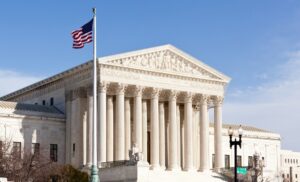 By Eden E. Anderson, Rebecca S. Bjork, and Gerald L. Maatman, Jr.
By Eden E. Anderson, Rebecca S. Bjork, and Gerald L. Maatman, Jr.
Duane Morris Takeaways: On April 12, 2024, the U.S. Supreme Court issued its decision in Bissonnette v. LePage Bakeries Park St., LLC, Case No. 23-51 (U.S. Apr. 12, 2024), holding that application of the transportation worker exemption in the Federal Arbitration Act (“FAA”) turns upon the work performed by the plaintiff and not the employer’s industry. The Supreme Court made clear, however, that this work-focused test should not bring within the exemption large swaths of workers who in some manner engage with products in the flow of commerce. The Supreme Court opined that the worker at issue must play a “direct” and “necessary” role in the free flow of goods across borders. Id. at 9. For employers with workplace arbitration agreements, the Supreme Court’s ruling is a required read.
Case Background
The defendant in Bissonnette produced and marketed baked goods, with its products made in 19 states and distributed across the country. The plaintiffs were franchisees who contracted with the defendant to distribute the products in local markets. The plaintiffs also advertised the products, identified retail buyers, and performed services for those retailers, including stocking and inventory. When the plaintiffs filed a putative wage and hour class action, the defendant sought to compel arbitration and to dismiss the class claims, citing a contractual arbitration provision with a class action waiver.
The district court granted the motion and the Second Circuit affirmed. The Second Circuit reasoned that, because the plaintiffs’ work was performed in the baking industry and not the transportation industry, the FAA’s transportation worker exemption did not apply. The transportation worker exemption provides that the FAA “shall not apply to contracts of employment of seamen, railroad employees, or any other class of worker engaged in interstate commerce.” 9 U.S.C. § 1.
Immediately after that decision, the U.S. Supreme Court issued its decision in Southwest Airlines Co. v. Saxon, 596 U.S. 450 (2022), wherein it held that the test to be employed in assessing application of the transportation worker exemption is based on the work performed by the plaintiff and not the employer’s industry. Nonetheless, on panel re-hearing, the Second Circuit adhered to its prior decision on the grounds that the transportation worker exemption still did not apply because the defendant’s business was to distribute baked goods into commerce and not transportation services.
The U.S. Supreme Court then granted review.
The Supreme Court’s Decision
As it did in Saxon, the Supreme Court emphasized in Bissonnette that the test for application of the transportation worker exemption focuses on the work performed by the plaintiff and not the employer’s industry. Addressing the employer’s argument that such a test would make virtually all workers who load or unload goods, such as pet shop employees and grocery store clerks, exempt transportation workers, the Supreme Court disagreed. It determined that the exemption has never been interpreted to apply in such a limitless basis. The Supreme Court emphasized that, for the exemption to apply, the worker “must at least play a direct and necessary role in the free flow of goods across borders.” Bissonnette, at 9. The Supreme Court thus vacated the order compelling arbitration and remanded for further proceedings.
Implications Of The Decision
Seemingly feeling its decision in Saxon was being misapplied, the Supreme Court’s ruling in Bissonnette confirms that the FAA’s transportation worker exemption turns upon the work the plaintiff performs and not on the employer’s industry. Thus, an employer cannot seek to compel arbitration and avoid application of the transportation worker exemption by arguing that it is not in the transportation industry. Rather, an employer’s arguments against application of the exemption must focus on the work the plaintiff performs.
